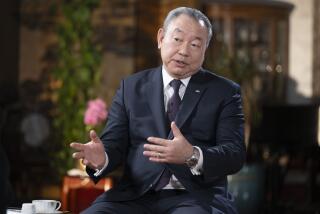Supporters Greet Leader of Taiwan : Diplomacy: President Lee Teng-hui begins historic but controversial U.S. trip with visit to L.A. area. He says he hopes for better ties to this country.
- Share via
Hundreds of flag-waving supporters Wednesday welcomed Taiwan President Lee Teng-hui to the Los Angeles area on the first stop of his historic but “private” journey to the United States, a visit that has angered mainland China.
Lee’s request for a visa to speak at Cornell University, his alma mater, put the Clinton Administration in a sensitive position because of Beijing’s opposition. Lee thanked President Clinton, Congress and the news media for creating support for his visit.
Through a spokesman, Lee said that he hopes the trip will lead to “further exchanges and closer friendship” between the United States and Taiwan, officially known as the Republic of China.
Lee, 72, is the first head of the island nation to visit the United States since the Nationalists moved their government to Taiwan in 1949 after the Communist takeover of China.
His controversial four-day trip is considered to be a breakthrough in Taiwan’s efforts to escape the diplomatic isolation, created when the United States broke off diplomatic relations with the island nation in 1979 and recognized China.
“I am excited about this development and hope that it will lead to an official recognition of Taiwan as a sovereign country,” said Li-Pei Wu, board chairman of General Bank in Los Angeles.
Wu was among the select group of nearly 100 Chinese American community leaders from throughout the state who met with Lee on Wednesday afternoon at the Ritz-Carlton Huntington Hotel in Pasadena.
Dennis Wong, chairman of the San Francisco Taipei Sister City Committee, said Lee told the gathering that China should not try to pressure the United States to box in Taiwan.
Lee also said that his country is ready and willing to take on more responsibilities in helping to solve the world’s problems, and that China and Taiwan need to cooperate in looking for a way to reunify peacefully.
Wong criticized the Beijing government for opposing Lee’s visit.
“China should be more magnanimous,” he said. “It is no longer playing in the Little League.”
China, which considers Taiwan a rebellious province, has warned that Lee’s trip will harm U.S.-Chinese relations. It has warned the United States of dire consequences for what it says is a U.S. betrayal.
Even as 500 loyalists cheered the arrival of the Taiwanese leader in front of the hotel Wednesday morning, a group of about 30 Taiwanese Americans demonstrated across the street.
Ting-Yee Wang, spokesman for a coalition of Taiwanese American associations in Southern California, said the protesters want an independent Taiwan without any vestiges of the Nationalist government created by emigres from the mainland.
“Taiwan belongs to the 21 million resident Taiwanese,” Wang said. He said to call the island nation the Republic of China is an injustice to people such as he whose families have lived on the island for many generations.
He criticized the Taiwan-born Lee for not being a strong advocate for the Taiwanese.
On Wednesday, Lee met with local and state officials, including Los Angeles Mayor Richard Riordan, state Secretary of Trade and Commerce Julie Wright, who represented Gov. Pete Wilson, state Protocol Chief William F. Black and state Treasurer Matt Fong, the highest-ranking Chinese American in the state.
In response to reporters’ questions, Black acknowledged that representatives of China have contacted him and expressed their displeasure about welcoming Lee to California.
“Our position is that we’re very friendly with [Lee] and Taiwan,” Black said. “California has an office in Taiwan, and they have received us very warmly. It would be silly and foolish of us not to recognize the long friendship that exists between Taiwan and California.”
Fong, who greeted Lee at Los Angeles International Airport, said he was invited to Lee’s home when he visited Taipei.
The Taiwan president held only private meetings, in keeping with the terms of his visa, his spokesman, Jason Hu, said.
*
Lee was restricted to visiting the Los Angeles area and Ithaca, N.Y., the home of Cornell, where he received a doctorate in agricultural economics in 1969.
Last year, Lee was refused a visa. But last month, the Clinton Administration relented after Congress overwhelmingly voted to support a private visit, calling Taiwan “a model emerging democracy.”
Taiwan has been ruled by emigres from China since Chiang Kai-shek moved his government to Taiwan after losing a civil war. After his death, his son, President Chiang Ching-kuo, took over.
Chiang had begun to liberalize Taiwan, but died in 1988 before the reforms took root. The job fell to Lee.
Working with conservatives and reformers, Lee forged a bloodless revolution that is to culminate next March when the Taiwanese elect a president in a free election for the first time.
Lee is considered a sure bet if he runs.
Times staff writer Ted Johnson contributed to this story.
More to Read
Sign up for Essential California
The most important California stories and recommendations in your inbox every morning.
You may occasionally receive promotional content from the Los Angeles Times.










